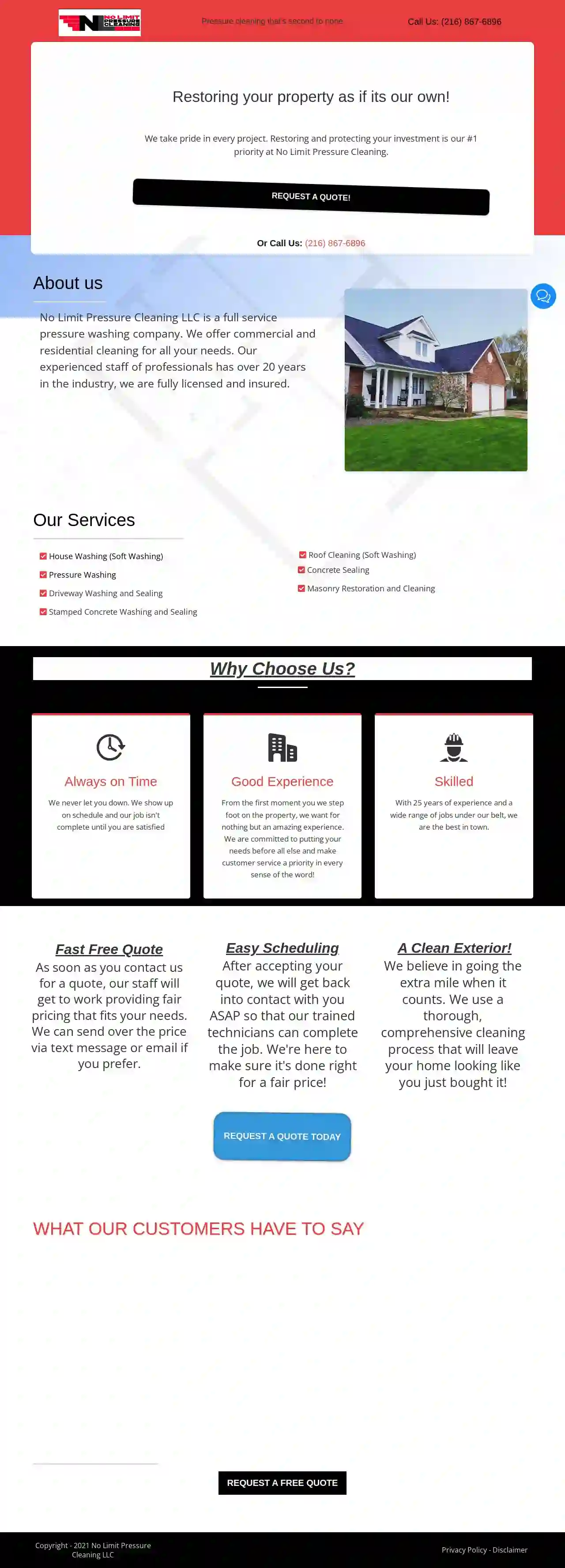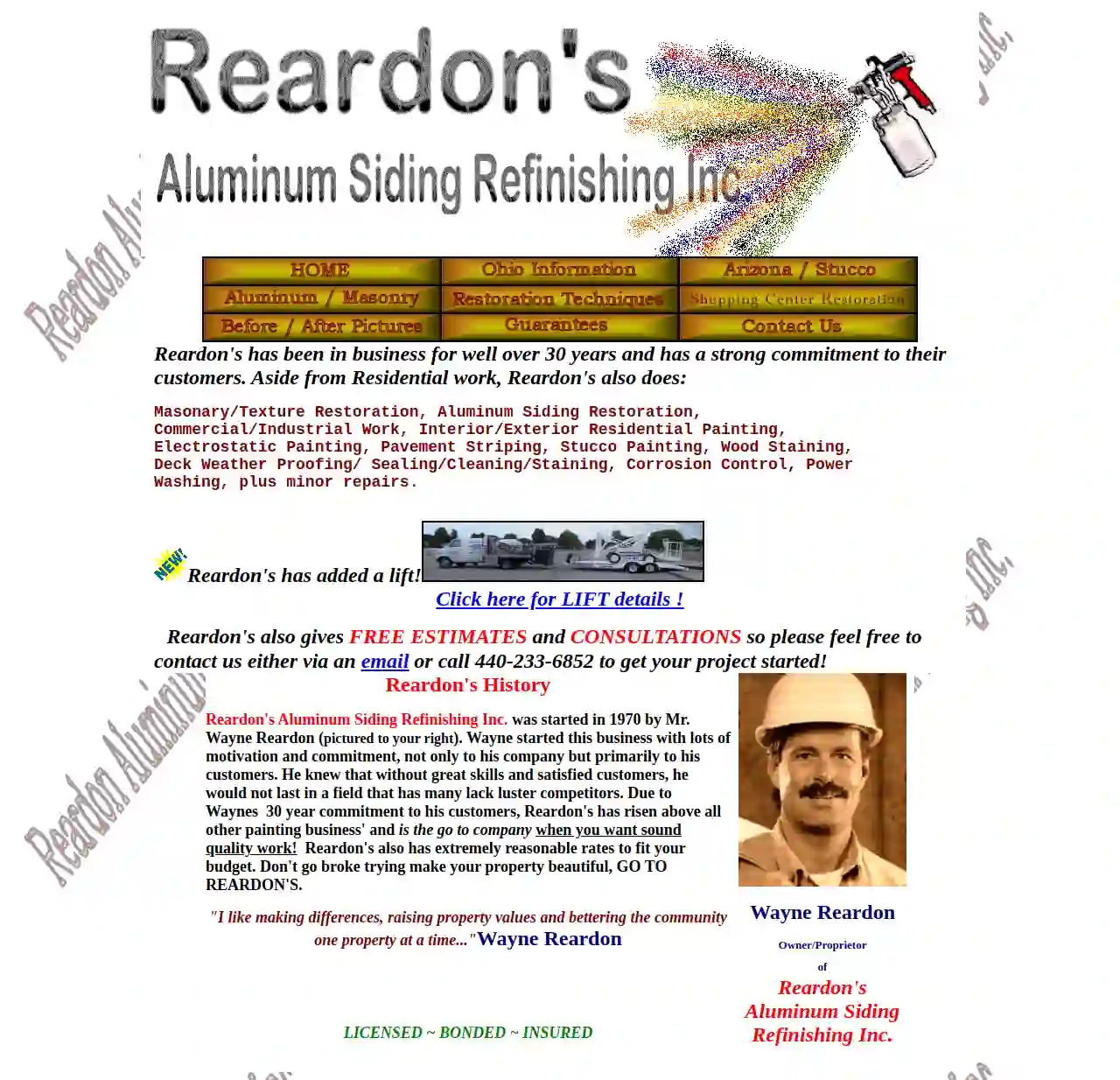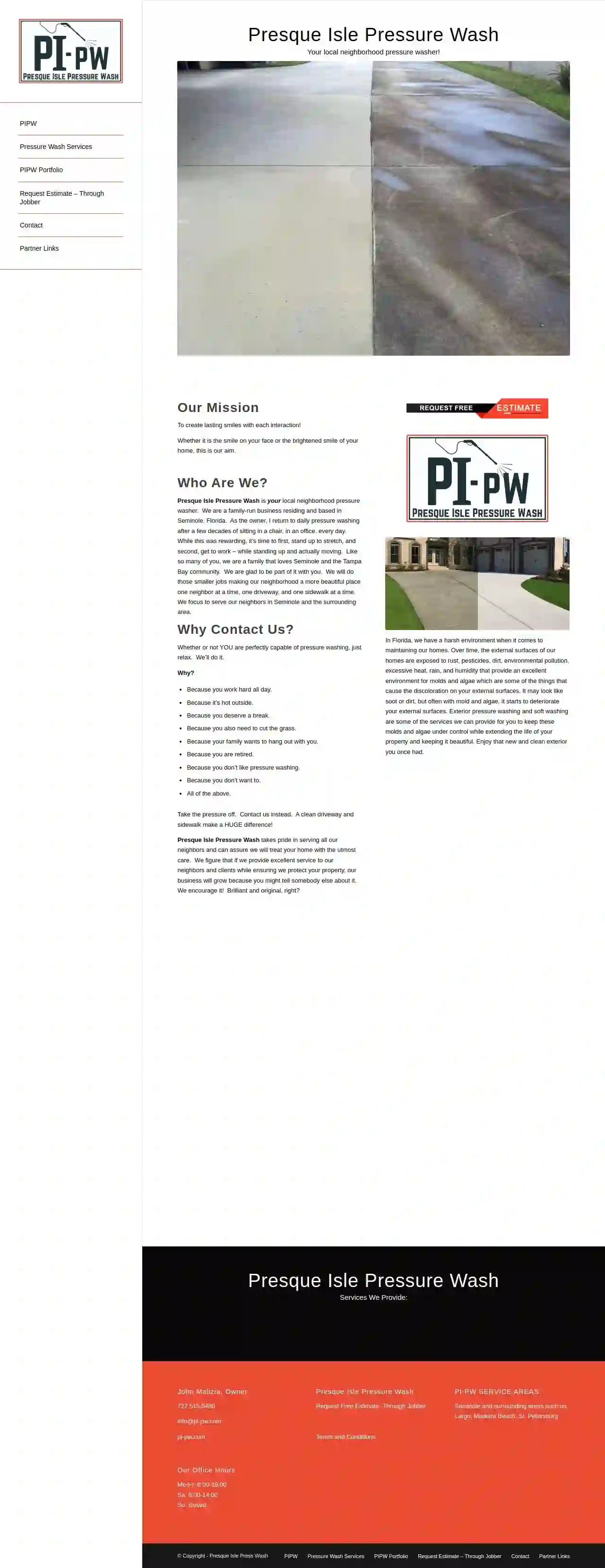Pressure Washing Jacksonwald
Find Exterior Cleaning in Jacksonwald
Get multiple Exterior Cleaning quotes for your project today! Compare profiles, reviews, accreditations, portfolio, etc... and choose the best offer.

Mountainbrook Powerwashing Services
51 reviews4786 Kissimmee Rd, Middleburg, 17842, USWe at Mountainbrook Powerwashing Services LLC are the most trustworthy power washing company in Selinsgrove for good reason—we offer free quotes so you know exactly what to expect from our services and how valuable they are to your Selinsgrove property. Our power washing company will ensure that any exterior surface that needs cleaning will be left spotless. Call 272-231-0940 today to guarantee your satisfaction with our services! Our power washing company is proud to offer power washing in Selinsgrove because residents take pride in their properties and we take just as much pride in our work. Whether you need roof cleaning for a residential property or whole building washing under our commercial power washing services, our power washing company has got you covered! Your Selinsgrove property is in good hands with our team of power washing professionals because we specialize in removing the following: Mud Stains, Oxidation, Efflorescence, Rust Stains, and Organics. No matter what type of buildup is blemishing your property, we can make every surface look as fresh as new and prevent any further damage these buildups may cause. For the best preventative and cosmetic care for your properties, call us now! Schedule a professional from our power washing company, Mountainbrook Powerwashing Services LLC, to clean any exterior surface of your Selinsgrove home by calling 272-231-0940 today!
- Services
- Why Us?
- Accreditations
- Gallery
Get Quote
ProMobile Hydro Cleaning
511 reviewsScranton, USCommercial cleaning is more than just bleach in a bucket. There are safety protocols and standards to be met in order to ensure all jobs are done properly and thoroughly for the safety of anyone entering the site. All of our technicians are fully certified and trained to handle any environment, from hospitals to biohazard spills. For us, when it comes to health and safety, there's no room for error. ProMobile Hydro Cleaning Company is a reputable cleaning service provider that specializes in hydro cleaning services. They offer a wide range of services, including pressure washing, steam cleaning, and hydro-jetting for residential, commercial, and industrial properties. With a team of experienced professionals and state-of-the-art equipment, ProMobile Hydro Cleaning Company ensures high-quality and efficient cleaning solutions for their clients. In an effort to limit damage to the environment, we have all of our technicians certified by the Cleaning Management Institute (CMI) in the latest methods and products of green cleaning available. Your Business is Ours We promise quality, reliable cleaning service every time so our loyal customers feel special. We work hard to be the best. Our products are high-quality and safe. And we focus on the details, so you have a clean, orderly office every time.
- Services
- Why Us?
- Gallery
Get Quote
Long Island Pro-Wash Pressure Washing
519 reviews807 Willow Rd, Franklin Square, 11010, USLI Pro-Wash is a pressure washing company that offers superior cleaning services for homes, businesses, and outdoor spaces. We use eco-friendly solutions and customized solutions to exceed customer expectations. Our team is committed to delivering high-quality workmanship, using eco-friendly products and techniques, and providing outstanding customer service. We strive to be a leader in the pressure washing industry by continuously improving our skills, knowledge, and equipment, and by staying up-to-date with the latest trends and best practices.
- Services
- Why Us?
- Testimonials
- Gallery
Get Quote
No Limit Pressure Cleaning LLC
516 reviews123 Main St, Cleveland, OH, 44130, USNo Limit Pressure Cleaning LLC is a full service pressure washing company. We offer commercial and residential cleaning for all your needs. Our experienced staff of professionals has over 20 years in the industry, we are fully licensed and insured.
- Services
- Why Us?
- Accreditations
- Our Team
- Testimonials
- Gallery
Get Quote
Sparkle Wash Berks County
510 reviews123 Main St, Suite 101, 19464, USSparkle Wash is a professional pressure washing service that offers a variety of services including commercial, residential, fleet, and new construction pressure washing. They have a team of professionals who are trained to handle all job site power washing tasks and ensure that the job is done on budget and on time. They also provide documentation about their products and equipment and a safety plan if needed.
- Services
- Why Us?
- Accreditations
- Our Team
- Testimonials
- Gallery
Get Quote
W. Reardon's Painting, LLC
51 reviews5877 Cherrywood Dr., Lorain, Ohio, 44053, USReardon's has been in business for well over 30 years and has a strong commitment to their customers. Aside from Residential work, Reardon's also does: Masonary/Texture Restoration, Aluminum Siding Restoration, Commercial/Industrial Work, Interior/Exterior Residential Painting, Electrostatic Painting, Pavement Striping, Stucco Painting, Wood Staining, Deck Weather Proofing/ Sealing/Cleaning/Staining, Corrosion Control, Power Washing, plus minor repairs. Reardon's has added a lift! Reardon's also gives FREE ESTIMATES and CONSULTATIONS so please feel free to contact us either via an email or call 440-233-6852 to get your project started!
- Services
- Why Us?
- Accreditations
- Our Team
- Testimonials
- Gallery
Get Quote
Aqua Blast Pressure Washing
546 reviews323 Wilson Ave, Port Clinton, 43452, USQUALITY IS EVERYTHING! Contact Aqua Blast Pressure Washing Today! Aqua Blast Pressure Washing is your experienced Marblehead pressure washing company. We provide premier pressure washing throughout Marblehead to ensure you're getting the best services for your home. We know that keeping your residential property clean and maintained can be a difficult job. That's why we offer multiple residential pressure washing services, so you can get the work you need done safely and efficiently. No matter what pressure washing project you have in mind, our experts can help. We work with everything from house washing to gutter cleaning to ensure you're getting the help you need. Pressure washing doesn't need to be an impossible task. To learn more about how the pressure washing experts of Marblehead can help with your home cleaning project, call Aqua Blast Pressure Washing today at 419-635-6961 or complete our online service request form. We are always striving to help you in the best way possible and aim to provide the highest quality pressure washing services in the area. No job is too big or too small, and we will be more than happy to quote you. Trustworthy Our team is very trustworthy and provide solid advice on what our clients require based on their situation. We take the opportunity to help our clients in any way that may be of particular benefit to them, regarding the use of our pressure washing service. All our staff are professional, courteous, and knowledgeable at all times whilst on the job, so you can be rest assured that you are in good hands. We guarantee all our work is handled in the most professional and timely manner, so you will have a pleasant experience with our entire service.
- Services
- Why Us?
- Gallery
Get Quote
Power wash Plus
25 Oriole Rd, Middletown, 07748, USPower Wash Plus is a soft washing company in Middletown, NJ, providing exterior services to maintain a beautiful exterior for your home. We take pride in knowing we can provide you with 100% satisfaction and guarantee a job done right. Our team of highly skilled technicians and staff will make sure that your home will be the talk of the town. We are fully insured, so you can have peace of mind knowing your property is in safe hands. We are dedicated to our local community, ensuring that our New Jersey homes are constantly rejuvenated and maintained year-round. Our passion is you, the customer, your home, and your family.
- Services
- Why Us?
- Testimonials
- Gallery
Get Quote
Outlaw Power Washing
591 reviewsLebanon, Pennsylvania, USOutlaw Power Washing is a professional power washing company that offers a range of services, including house washing, pressure washing, soft washing, and more. With over 15 years of experience, our team is dedicated to providing top-notch service and ensuring customer satisfaction. Our equipment is high-tech and we have multiple machines to get the job done fast and efficiently. We are fully accredited and insured, and our team is made up of experts who are passionate about their work. We serve Lebanon, Pennsylvania, and surrounding areas, and we offer free estimates for all our services. Contact us today to learn more about how we can help you blast the dirt away!
- Services
- Why Us?
- Our Team
- Testimonials
- Gallery
Get Quote
Presque Isle Pressure Wash
12345 Seminole Blvd, Seminole, FL, 33772, USPresque Isle Pressure Wash is a family-run business based in Seminole, Florida. Our mission is to create lasting smiles with each interaction. We focus on serving our neighbors in Seminole and the surrounding area. We provide services such as driveway cleaning, sidewalk cleaning, walkway cleaning, patio/pool area cleaning, house washing/rinsing, and soft washing. Our goal is to treat your home with the utmost care and ensure we protect your property.
- Services
- Why Us?
- Accreditations
- Our Team
- Testimonials
- Gallery
Get Quote
Over 60,241+ Cleaning Services on our directory
Our cleaning service providers operate in Jacksonwald and surrounding areas!
CleaningMatch has curated and vetted the Best Cleaning Services in Jacksonwald. Find the most trustworthy contractor today.
Frequently Asked Questions About Pressure Washing
- Annually: Pressure washing your house at least once a year helps remove accumulated dirt, grime, and other contaminants, keeping it looking its best.
- Every 2-3 Years: If you live in an area with high humidity, heavy tree cover, or frequent exposure to pollutants, more frequent pressure washing may be necessary.
- When Visible Dirt and Grime Appear: Address visible dirt, stains, or mold growth promptly to prevent them from becoming more challenging to remove.
- Wear Protective Gear: Wear safety glasses, closed-toe shoes, and long pants to protect yourself from flying debris and water spray.
- Never Point the Nozzle at Yourself or Others: High-pressure water can cause serious injuries. Always point the nozzle away from yourself, others, and pets.
- Use Caution on Ladders: If working on a ladder, ensure it is stable and secure. Avoid overreaching or leaning too far to one side.
- Be Mindful of Electrical Hazards: Keep water away from electrical outlets, wiring, and appliances.
- Follow Manufacturer's Instructions: Always read and follow the pressure washer manufacturer's instructions for safe operation and maintenance.
- Pressure Washing: If your siding is in good condition but dirty or stained, pressure washing can effectively restore its appearance without the need for painting.
- Painting: If your siding is faded, chipped, peeling, or damaged, pressure washing alone may not be sufficient. Painting provides a fresh coat of protection and a new look.
- Pressure Washing Before Painting: Pressure washing is an essential step before painting, as it removes dirt, grime, and loose paint, creating a clean surface for the new paint to adhere to.
- 0-degree Nozzle: Produces a highly concentrated, powerful jet of water for removing stubborn stains or stripping paint. Use with caution as it can damage surfaces easily.
- 15-degree Nozzle: A versatile nozzle for cleaning concrete, brick, and other hard surfaces. Provides a good balance of pressure and coverage.
- 25-degree Nozzle: A wider spray pattern for cleaning delicate surfaces like siding or fences.
- 40-degree Nozzle: A very wide spray pattern, ideal for rinsing or applying cleaning solutions.
- Soap Nozzle: A low-pressure nozzle designed specifically for applying cleaning solutions.
- Rotary Nozzle: Also known as a turbo nozzle, it produces a rotating, high-impact spray for tackling tough stains and grime.
How often should I pressure wash my house?
Regular pressure washing can maintain your home's exterior, extend the lifespan of your siding, and enhance its curb appeal.
What are some safety precautions to take when pressure washing?
Prioritizing safety when pressure washing protects you and others from potential injuries or accidents.
Is it better to pressure wash or paint my house?
Assess the condition of your siding and your desired outcome to determine whether pressure washing, painting, or a combination of both is the best approach.
What are the different types of pressure washer nozzles?
Choose the appropriate nozzle based on the cleaning task and the type of surface being cleaned. Consult the pressure washer manual or a professional pressure washer for guidance.
How often should I pressure wash my house?
- Annually: Pressure washing your house at least once a year helps remove accumulated dirt, grime, and other contaminants, keeping it looking its best.
- Every 2-3 Years: If you live in an area with high humidity, heavy tree cover, or frequent exposure to pollutants, more frequent pressure washing may be necessary.
- When Visible Dirt and Grime Appear: Address visible dirt, stains, or mold growth promptly to prevent them from becoming more challenging to remove.
Regular pressure washing can maintain your home's exterior, extend the lifespan of your siding, and enhance its curb appeal.
What are some safety precautions to take when pressure washing?
- Wear Protective Gear: Wear safety glasses, closed-toe shoes, and long pants to protect yourself from flying debris and water spray.
- Never Point the Nozzle at Yourself or Others: High-pressure water can cause serious injuries. Always point the nozzle away from yourself, others, and pets.
- Use Caution on Ladders: If working on a ladder, ensure it is stable and secure. Avoid overreaching or leaning too far to one side.
- Be Mindful of Electrical Hazards: Keep water away from electrical outlets, wiring, and appliances.
- Follow Manufacturer's Instructions: Always read and follow the pressure washer manufacturer's instructions for safe operation and maintenance.
Prioritizing safety when pressure washing protects you and others from potential injuries or accidents.
Is it better to pressure wash or paint my house?
- Pressure Washing: If your siding is in good condition but dirty or stained, pressure washing can effectively restore its appearance without the need for painting.
- Painting: If your siding is faded, chipped, peeling, or damaged, pressure washing alone may not be sufficient. Painting provides a fresh coat of protection and a new look.
- Pressure Washing Before Painting: Pressure washing is an essential step before painting, as it removes dirt, grime, and loose paint, creating a clean surface for the new paint to adhere to.
Assess the condition of your siding and your desired outcome to determine whether pressure washing, painting, or a combination of both is the best approach.
What are the different types of pressure washer nozzles?
- 0-degree Nozzle: Produces a highly concentrated, powerful jet of water for removing stubborn stains or stripping paint. Use with caution as it can damage surfaces easily.
- 15-degree Nozzle: A versatile nozzle for cleaning concrete, brick, and other hard surfaces. Provides a good balance of pressure and coverage.
- 25-degree Nozzle: A wider spray pattern for cleaning delicate surfaces like siding or fences.
- 40-degree Nozzle: A very wide spray pattern, ideal for rinsing or applying cleaning solutions.
- Soap Nozzle: A low-pressure nozzle designed specifically for applying cleaning solutions.
- Rotary Nozzle: Also known as a turbo nozzle, it produces a rotating, high-impact spray for tackling tough stains and grime.
Choose the appropriate nozzle based on the cleaning task and the type of surface being cleaned. Consult the pressure washer manual or a professional pressure washer for guidance.